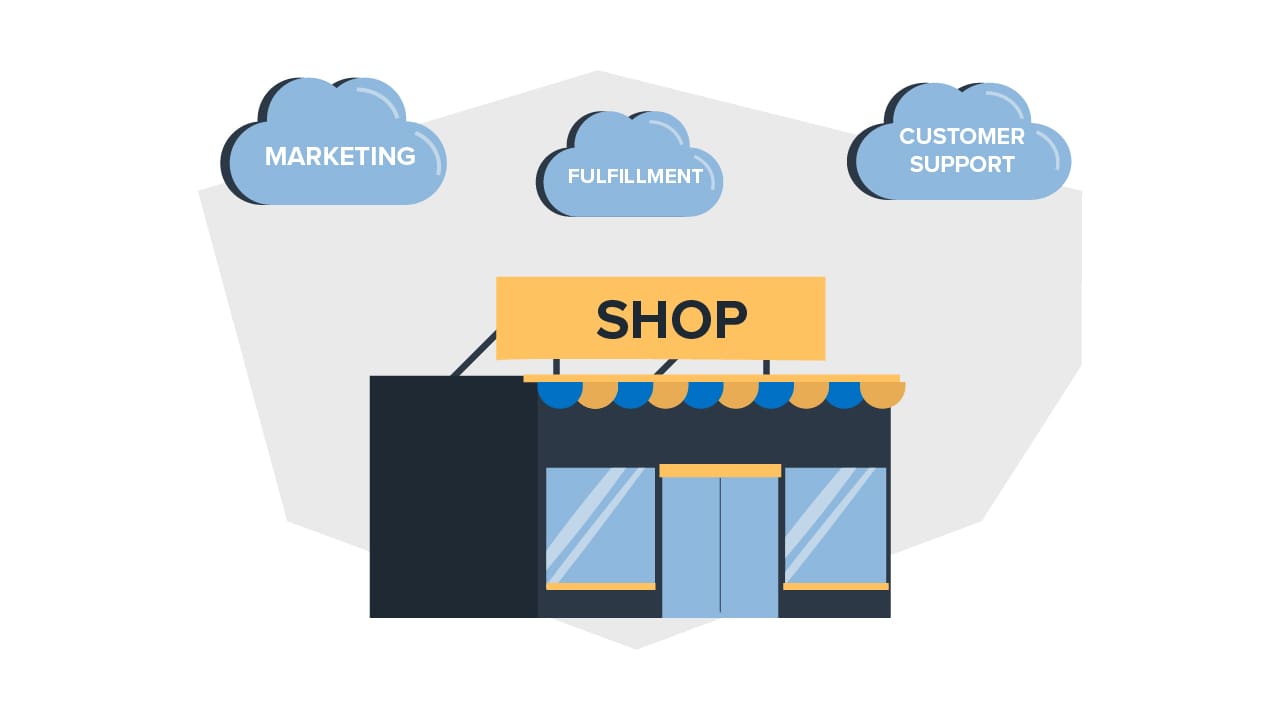
4 eCommerce Roles to Delegate, and 4 to Keep In-House

When first starting an eCommerce business, you may be surprised to learn there’s far more involved than just buying and selling stock. You also need to manage the order fulfillment process, finances, marketing, customer service, product development, and more.
As your business grows, you may reach a point where you need to outsource to avoid being overwhelmed. Knowing which tasks and roles to delegate can be difficult. However, delegating work to other people is one of the most effective ways to cut business costs and make your eCommerce company more efficient.
Approaching this problem with a strategic mind will improve the performance of your eCommerce business by appointing the best person (or team) to work in the necessary roles within the company.
We’re here to demystify the delegation question.
Read on to learn the four eCommerce roles you should outsource and the four you should keep in-house.
Four eCommerce roles to delegate
As a business owner, there’s only so much work you can manage before you need to think about delegating. Otherwise, you’ll quickly realize your potential revenue is limited by the number of hours you’re able to put into your business.
The four eCommerce roles we recommend you delegate are:
- Marketing asset creation and management
- Order preparation and fulfillment
- Product listing management
- Accounting and filing
We’ll dive into each of these roles to explain how and why outsourcing (at least at first) these eCommerce tasks will benefit your business.
1) Marketing asset creation and management
Running an eCommerce business is as much about marketing as it is about sales.
Your eCommerce marketing activity is a powerful customer retention strategy. You can retain customers and increase customer loyalty through various marketing activities such as email marketing and retargeting ads.
According to research by Barilliance, 45% of customers open cart abandonment emails, and 10.7% of people who open cart abandonment emails will complete their purchase. These numbers highlight the importance of keeping your customers engaged and informed with a well-thought-out marketing strategy.
However, eCommerce marketing can be complex. It may consist of organic social media, pay-per-click (PPC) advertising, search engine optimization (SEO), email marketing, and paid social media, to name just a few. To get the most impact on those channels, you need copywriters, designers, and sometimes even videographers. If you don’t have in-house expertise in these areas, delegation gives you access to specialists in their field.
For these reasons, it’s often best to delegate the marketing activities for your online shop to an eCommerce marketing freelancer or agency. They’ll use their skills and previous experience to drive positive results for your store.
2) Order preparation and fulfillment
As your eCommerce business gains traction and your daily sales begin to grow, you may struggle to manage the order fulfillment process on your own. You can remove bottlenecks in your order process by outsourcing order preparation and fulfillment to a dedicated third-party logistics company.
Outsourcing this task can lower shipping rates, reduce operating costs, and increase your business reach. It will also free up your time to focus on other areas of your eCommerce business such as new product development or business planning for the year ahead.
At MyFBAPrep, we help Amazon sellers manage their FBA prep work easily by handling their logistics through our specialist team. We’ll hold your inventory, prep your orders, update your Amazon inventory, and send your order to the Amazon Fulfillment Center on your behalf. With our support, vendors can reap the benefits of selling on Amazon knowing we’re here to help oversee order logistics.
3) Product listing management
Keeping your products up to date can be time consuming.
From managing your eCommerce listings to reviewing product performance, overseeing CRM integration, and checking product quality and traceability, there are many tasks involved in product information management.
If you’re short on time, you might benefit from delegating listing testing, optimization, and reporting to someone who can dedicate their full attention to these tasks.
This person or group will manage all aspects of your product information to ensure your online lists are updated and optimized for performance, setting you up for omnichannel success. You can also use a suite of tools to take on some of these tasks, like a repricer.
Having a dedicated outsourced team of experts can show you the ropes when it comes to listing optimization, and can manage and report on the various optimization tests they will run.
This helps you effectively manage, optimize, and sync your product information across all of your routes to market. This will make it easier for you to expand your product range, increase conversion rates, and sell on new eCommerce channels.
In the end, you’ll come away with a formula for success for your catalog, and an idea of how to optimize any new SKUs.
4) Accounting and filing
Are you keeping on top of your eCommerce finances?
As your online store grows, you need to adjust how you control your business finances. A clear understanding of your eCommerce finances will allow you to better forecast your revenue, product margins, taxes, department budgets, stock requirements, and your ongoing cash flow.
Unless you’re a large business with your own finance arm, delegating your business finances to an account that specializes in eCommerce could be your best solution.
Traditionally, eCommerce businesses would hire an in-house accounting team or bookkeeper. These days, however, it can be more cost- and time-effective to outsource this workload to an accountancy partner who can adapt, scale, and be flexible to your business needs as the market fluctuates.
Your accountancy partner will help you keep tabs on your financial data across all your sales channels. They can also advise you on things you need to do to improve your finances in the future by having a clear understanding of your current numbers, competitor market, and projected sales.
You can always bring this role back in-house as you grow. Once your finances are large and complex enough to justify a dedicated finance team, you can ask your accountant to turnover what should be pristine records for your own team.
Four eCommerce roles to keep in-house
You shouldn’t outsource all eCommerce roles.
The tasks you choose to manage in-house depend on your business’s unique circumstances. You need to play to your company’s strengths by knowing which roles you can confidently oversee internally and which to hand over to an external team.
From our experience working with a large number of eCommerce businesses, we’ve highlighted the four eCommerce roles that are usually best managed in-house:
- Customer service
- Sales
- Product development
- Recruitment and training
We’ll explore each of these roles in greater detail so you can easily understand how keeping these eCommerce roles internally can benefit your business.
1) Customer service
Your in-house team best understands the ins and outs of your eCommerce business. So, they’re also the best people to support your customers with their shopping experience.
Excellent customer service can be the difference between an eCommerce business that succeeds or fails. In fact, 58% of customers say they will sever a brand relationship if customer service expectations fall short.
If you maintain control over your customer service, you can ensure customers receive prompt communication and fast solutions to their problems. It also strengthens your brand as your internal team will handle customer enquiries and complaints in a way that aligns with your company values and strategy.
Additionally, a 2017 report by KPMG found that customers are more likely to trust a business that makes it easy for them to contact someone at the company.
What an outsourced team considers to be “good” customer care may not align with your business values. This could lead to a brand disconnect and, in turn, disgruntled customers, as they don’t get a satisfactory resolution. In-house employees offer a more personal and attentive service that both aligns with your brand values and keeps your customers coming back for more.
2) Sales
As your eCommerce business grows, you may want to appoint a dedicated sales person or team to help you break into new markets or manage wholesale orders.
On a B2B level, your in-house sales team can take the lead on expanding your wholesale opportunities and nurturing relationships with existing wholesalers and suppliers.
Working closely with other departments and employees, an internal sales team will have a solid grasp on current business operations and upcoming product developments. This will allow them to be proactive in their sales pitches, keeping your B2B wholesale customers satisfied.
On a B2C level, an in-house sales team will develop a clear understanding of customer needs and how to solve their pain points. Your team can operate on an inbound basis, conveniently helping customers complete their online orders. This personalized sales experience will encourage customers to shop with you again.
Your in-house sales team can use data to help your eCommerce business understand your customers, launch perfectly timed promotions, and increase repeat orders.
3) Product development
It’s important to invest in your business constantly and find creative ways to keep your customers engaged. New product development and procurement are vital aspects of retaining customers and connecting with new ones.
If you want to gain a competitive edge over other sellers in your market, you need to invest in new products, whether that’s through development or sourcing.
While you can outsource this task to a product sourcing agent, they won’t understand the key values or needs of your business as well as an in-house team.
Your internal team can research upcoming trends and find new products that are well suited to the customers you want to attract. They can also develop strong relationships with suppliers and manufacturers to help you improve margins for new products.
4) Recruitment and training
A strong eCommerce team is fundamental to maintaining the growth and success of your online store.
Managing talent acquisition, onboarding, and training in-house will ensure new employees are a perfect fit for your company values, practices, and expectations. Your internal human resources team can also assist your employees throughout their career journey within your company, allowing you to oversee the growth and development of each individual. It will also forge strong relationships in your business — something that’s crucial for ensuring business operations run smoothly.
Your in-house recruitment and training team can help develop employee materials such as company policies, procedures, specifications, and best practices. These training materials act as a go-to resource for employees to understand how to respond to certain situations within your business. Having an internal team create and update these resources will keep your training materials aligned with your current business needs and strategies.
Recap: eCommerce delegating vs. in-house
Every eCommerce business has different needs that determine whether to outsource work or keep it in-house.
Which tasks you should or should not delegate depend on the unique structure and needs of your business. With that said, the above suggestions are a great starting point for eCommerce business owners who are trying to decide which roles could benefit from outsourcing and which may best be kept in-house.
The key takeaway is to maintain control over the roles you are strongest at, or that you know will benefit the most if managed by an in-house team. Similarly, you should outsource any roles your business isn’t currently built to manage, or that require an experienced and specialized team that you don’t have.
When choosing which roles to delegate or keep in-house, you should also consider the potential costs and return on investment of each option. Some roles may be more expensive to oversee internally, but doing so could also increase your return on investment compared to delegating the role to an external partner.
